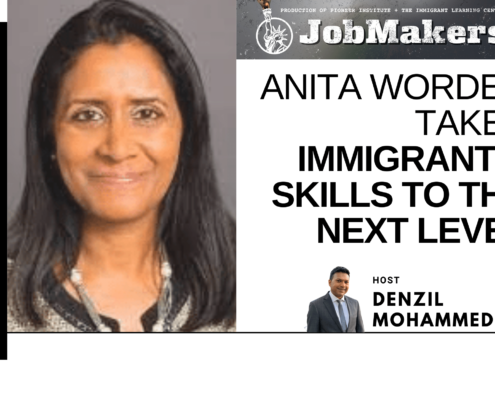Mariam Nusrat Takes Gaming to New Heights
/in Economic Opportunity, Featured, JobMakers /by Editorial StaffThis week on JobMakers, host Denzil Mohammed talks with Mariam Nusrat, immigrant from Pakistan and founder and CEO of both the venture-backed Gaming Revolution for International Development and the not-for-profit Gaming Revolution for Inspiring Development, both with the acronym GRID. GRID, the for-profit arm, is democratizing the creation of video games with a software-as-a-service platform called Breshna, while the not-for-profit arm creates low-cost social impact games that educate, engage and empower people towards positive behavior change. Nusrat, economist-turned-tech entrepreneur, stands out as a Muslim immigrant woman in tech. She aims to empower the world’s 3.2 billion smartphone users, as you’ll discover in this week’s JobMakers.
Guest:

Mariam Nusrat is the Founder of GRID – Gaming Revolution for International Development, a tech start-up that aims to unleash the power of video games to educate, engage and empower people for positive behavior change. The team has built Breshna, a platform that creates purposeful video games with no-code, at low-cost & lightning speed. Mariam is on the Forbes Next 1000 List and a recipient of the Clinton Global Initiative University Honor Roll Alumni Award. She has presented GRID at several high-level forums including two sessions moderated by President Clinton at CGIU Meetings and two Tedx events. Since its launch, GRID has received extensive media attention with articles in Huffington Post, Washington Post, Daily Mail UK, Yahoo News and other mainstream news channels, and was included in the DC Inno 50 on Fire companies.
Get new episodes of JobMakers in your inbox!
Read a Transcript of This Episode
Please excuse typos.
Denzil Mohammed:
I’m Denzil Mohammed, welcome to JobMakers.
Denzil Mohammed:
What is the average age of a gamer? Someone who plays video games, bet you didn’t guess 35. That’s right. The profile of gamers today span every demographic, not just kids, but it doesn’t have to be just fun and games. What if we could be educated from gaming? What if we could have social justice impact from gaming and what if we could become the game creators ourselves from Mariam Nusrat, immigrant from Pakistan and founder and CEO of both the venture act gaming revolution for international development and the not-for-profit gaming revolution for inspiring development. Both of course, with the acronym GRID, these things are reality. GRID, the for profit arm is democratizing the creation of video games with a software as a service platform called Breshna and the not-for-profit arm creates low cost social impact games that educate, engage and empower people towards positive behavior change. However, this economist turned tech entrepreneur stands out: a Muslim immigrant woman in tech, Mariam is doing it and aims to empower as many of the 3.2 billion smartphone users worldwide. As you’ll discover in this week’s JobMakers, Mariam Nusrat,immigrant from Pakistan and founder and CEO of GRID. Welcome to the JobMakers podcast. How are you?
Mariam Nusrat:
Thank you so much Denzil. I’m excited to be here. Thank you so much for having me. And I’m excited to have a conversation with you.
Denzil Mohammed:
I’m excited to meet you because you have such a cool product. Tell us a little bit about your business and your particular market. What does grid stand for? First of all?
Mariam Nusrat:
Absolutely. So GRID is an acronym that actually stands for two legal entities. So gaming revolution for international development, which is a C corp. It’s a tech startup building the TikTok for video games. So basically BRNA is a platform that allows anyone to create their own video games without any coding, without any design skills, anyone can come on and make their own video games, be it entertainment games, or education games or marketing games. But this is like, imagine if you wanted to make a super Mario for math learning, you can go on to bra now and create that. And bra itself means lightning in the PTO language, which is my mother tongue. So it’s video games without any coding and it lightning speed. So that’s grid on the C Corp and then gaming revolution for inspiring development is our not for profit arm. And that’s where we create low cost mobile games for positive behavior change. So grid stands for gaming revolution for international or inspiring development.
Denzil Mohammed:
That is very, very cool. And you, you just mentioned international development, you’re an economist, an educational specialist you’ve worked in international development. How did you end up in gaming?
Mariam Nusrat:
Yeah, then <laugh> I often ask myself the same question. So it’s like, you know, my, I I’ve done my, my bachelors was an econ. My master, my first master’s from lumps was an econ. My second master’s at GW was in international development studies. There is no computer science, no game development in any of that. And I worked for 12 years at the world bank across 22 different countries. Sub-Saharan Africa, south Asia, middle east as an education specialist, as a policy maker in the education space. And eight years ago, one of the things I realized was that purposeful communication. So if you wanna raise awareness on education or health or behavior change or financial literacy, it’s often here’s a brochure. Here’s a web website. Maybe if things get really exciting, here’s a video, but that’s not how behavior change happens. Right? If we look at the Western world, what Fitbit did for health, where it completely gamified health, what I grew up playing games like SIM city, where I was learning about urban planning without even knowing I was learning about urban planning, we just don’t see video games being mainstreamed for behavior change so that I was actually undoing my second master’s degree.
Mariam Nusrat:
So I was a consultant at the world bank, a student at GW. And that’s when I said, you know what? I don’t see video games being mainstream for a purpose beyond entertainment. So I’m gonna make a gaming studio where we’re gonna create mobile games for positive behavior change. So I put together a team of game developers and designers, and we started creating one of our first game was actually a menstrual health game, a period game, a mobile game, which was in English or do Swahili Nepalese. And basically the big idea was to build awareness around reproductive health and menstrual health. So that, that was kind of the beginning of gaming. It came from a pain point of making purposeful communication, fun,
Denzil Mohammed:
Making personal, purposeful communication, fun. I love that. And this ties into something that I think is sort of inherent in you. And maybe you got it from your parents. You once mentioned that the idea of public service is something you got from your parents. So why is it important to you to use technology in this way?
Mariam Nusrat:
Yeah, absolutely. So dental I grew up, my, my dad was in the public service all his life. So I saw, I mean, I I’m, I’m, I’m, I’ve seen policy and public service as I’ve been growing up. Right. And one of the things that my father and this is like, I mean, I think I was in third grade and he came back from, from an executive course and he literally had these three newspaper cuttings. Okay. The first one had the logo of lumps, which is the top business school in Pakistan, Lahore university of management sciences. The second one was a logo of London, school of economics. And the third one was a logo of the world bank. I’m in third grade. And this guy is like, all right, child, you’re gonna go, you’re gonna go to alums. You’re gonna do your bachelor’s in econ.
Mariam Nusrat:
Then you’re gonna do your master’s in econ. And then you’re gonna go work at the world bank. And I’m like, whoa. And then he held my fist and he was like, the world is in your hands. And he was like, no matter, like it is directly proportional to the hard work that you put in. So I think that lens of public service international development policy was something that was really like built into my DNA. But over time, one of the things I realized is that I have the solutions oriented approach to things. And I think the more and more I discover technology in my daily life and video games as a K, like, you know, how are we not unleashing the power of video games for a purpose beyond entertainment? Like, look at the time that we spend on games, there are 1 billion video game players playing video games for one hour on average around the world, right? Like 1 billion people for one hour, every single day they’re playing video games can be unleashed this time for a purpose beyond entertainment. So that was kind of what led me to it. So I think the pain point I realized to my nurture and training, but the solutions came from my passion for technology.
Denzil Mohammed:
And I think you mentioned at some point that the average gamer is a 35 year old woman on the subway playing candy crush.
Mariam Nusrat:
Yeah. And I think we’re also one of the most overlooked demographics in video games, right? Like when you, when you think about a gamer, it’s often the 22 year old in a basement playing column duty for seven hours. But actually the fastest growing genre of games is the hyper casual genre of games, which is mobile games. So like, you know, games like candy crush and games like angry birds you know, people spend a lot of their time waiting. So on average, a Western, a person in the Western world spends seven years of their life waiting for stuff to happen. You’re on the Metro waiting, you’re at the DMV office waiting you’re, you’re like in the line, you wait for things to happen. And that’s where people weave in video games, right? So games become a part of their daily routine. And I believe that brash now is empowering that 35 year old woman to not just play her own games, but also to make them it’s like, be it just like the talk for video games. So it’s about this idea of there’s 1 billion players around the world. Can we also have 1 billion makers that can tell their story through video games?
Denzil Mohammed:
Oh, that is so cool. And I brought up the 35 year old woman on this, on the subway, because just to show the cross section of people you can reach. And you mentioned TikTok. And I think about my eight year old and 10 year old nephews who spend so much time on take TikTok and non video games, but they’re very, they learn a lot from some of these videos, you know, they come with all sorts of trivia and they get interested in animals or climate change, things like that. So they are, they are open to learning from these things from this kind of technology. So I really am happy that you brought that up. As we brought up your parents let’s take it back. You mentioned alums, it’s a university in Pakistan. You are from Pakistan and you still identify as Pakistani. Can you describe for listeners what life was like in Pakistan growing up?
Mariam Nusrat:
Yeah, absolutely. So dental, I was born in cueta, which is actually like you know, one of the most conservative provinces within Pakistan. My, my, my mom is originally from that province. And my dad is he migrated from India, you know, right. When he was young and everything. So it’s like, so, and, and then I grew up in the capital, which is a Stavan and often, you know it’s actually funny Denzel I’ve had, I’ve had interviews where it’s been like, oh, you were the suppressed woman in Pakistan. And what does life feel like in America? But actually, I mean, I grew up with a father who, who just believes in empowering daughters. And I think that level of confidence that my dad put into me this idea that there is no ceiling that I cannot push through with hard work, with the right amount of passion.
Mariam Nusrat:
I mean, we grew up as as a, as a middle income family, but our education was the top priority. So my, my parents were just investing in our education, private schools, whatever it took, French classes, swimming classes, like whatever it took. Right. I mean, even in Pakistan it was like, Hey, I mean, that is the biggest investment. They could make it wasn’t buying properties. Even today, they live in a rental house, but for us, the biggest thing was it wasn’t buying cars. It wasn’t buying properties, it was putting money into our education and that’s been the biggest investment that they could’ve made. So that’s, that’s kind of what life looked like. I think I, I hope that I’ve made them, I, I think I’ve made them very, very proud. They do say I’ve made them very, very proud. But it’s also very Asian parents. Like I, I remember I was on stage with president Clinton and, you know, as part of the Clinton global initiative university and I called my dad and I was like, that was so cool. Did you see that it got livestream on state? It was like, that was amazing. What a great honor now make sure the next one is a sitting president. <Laugh> all right. I guess we’re on it, but yeah,
Denzil Mohammed:
Difficult to please guide, but you know, as, as a past interviewer interviewee set on this podcast, you know, if you’re gonna dream, don’t just dream hair dream higher.
Mariam Nusrat:
My first few years at in the us are complete blur because I think I overworked and I, I over studied. But you know, I think there’s that I’ve always approached every single day with the three piece. And I think it’s perseverance passion and purpose. Right. If you show up every single day working towards a goal with the passion, I think it just becomes relatively easy and relatively fun. And then you just have enjoy the ride along the way.
Denzil Mohammed:
I don’t imagine that you came to the us with the intention of being a business owner or certainly not gaming. So what was it like when you first started? How did you get funding? You know, how did you go about scaffolding this business?
Mariam Nusrat:
Absolutely. So Dan I’ll actually touch on a little bit, like the very beginning and then bring you to this actual, like the C Corp, which is the venture bank business business, where we have venture funding and investors and all of that, because that’s, that’s a really exciting part to it. But I think, you know, when, when, when I started off, like I, I had achieved the dream that my dad set for me, which was work at the wall bank. Right. So I was on this path of like, alright, you know, economist, senior economist, education, specialist, manager, country, director, vice president, like that’s, I mean, I had it all charted out for me and everything. So I think this idea of starting grid and kind of in the beginning, like a site gig. Oh, okay. That’s cute. You know, you’re making video games, that’s cool and everything, but it started to take a life of its own.
Mariam Nusrat:
Right. And I did it as a side gig for a while and everything. But last year when we started building Braham under a C Corp, it was like, okay, this is getting real. And we’re gonna go raise funding for this. And we’re gonna raise venture capital. And when I started them’s light, I mean, I’m an east coast founder with no business, no tech background. Like I did not know the difference between a VC and an angel. And today it’s really, really cool. We’ve raised 2.5 million in venture capital over this last span of seven months. And we have on our cap table this is something that I can actually share now. I mean, we have on our cap table, the American billionaire bill Atman, or for instance, we have, you know, I mean, some really cool web three crypto funds, web two funds.
Mariam Nusrat:
So it’s, it’s really been a really epic journey and everything. And I think what, the way I approach it is, is, you know, I mean, I know nothing, but there’s so much to learn and that’s the exciting part of it, right? I mean, we live in the world of the internet. Twitter is out there. We’ve been building in public, we’ve been making connections. I think what COVID did was really bring people to the virtual world. So the opportunities that were at first limited to Silicon valley, all of a sudden became global. You did not have to be in the bay area to go meet someone. You could just get on the zoom. So I think I’ve, I’ve had 320 investor meetings where you just knock on doors and you get a lot of nos, but then once the dominoes start falling, you get a lot of yeses. And you know, I mean, all of those, mostly out of those, I think 90% of those have been virtual. People have never met in real life. I have investors in our cap table that I still haven’t met. Right. And everything. And I think that is just such a cool opportunity where it’s not just where you are as an immigrant in America, you could be in anywhere any part of the world right now and have access to the same opportunities.
Denzil Mohammed:
What did it feel like? However, going and asking for any being an immigrant, having an accent.
Mariam Nusrat:
Absolutely. So I think dental, I, I, I, I have to admit, right. The imposter syndrome is very real, right. Saying, Hey, you know what I mean, do I belong? I mean, do I belong in the gaming industry? Do I belong in the web three world? I mean, the blockchain industry tech sector is just expanding and growing so rapidly. And I mean, do I belong in any of these spaces? And I think honestly the biggest barrier is your own mental barrier, right? I mean, being able to say, okay, you know what, I I’m, I’m gonna give it a shot. I’m gonna show up with authenticity and I’m gonna show up with my passion and then let the space decide whether they wanna accept me or not. And I’ve, I’ve just seen such, such an insane amount of acceptance and this, and this is the beautiful thing about America is I do believe that the, if you want, there’s a community that gets created around you and then they rally you and they mobilize you. Right. It’s like, I mean, and at that point, I do think it becomes irrespective of your gender, the color of your skin, the religion you are, because at that point, it is that married based hard work, that sheer passion that just runs through. And then, and then everyone just rallies behind you. So I think and I think immigrants have that resilience and that grit to, to have that passion showed true. So I, I think, I think it’s been really interesting.
Denzil Mohammed:
Give us some examples of your favorite or most impactful or original games and the issues that they tackled
Mariam Nusrat:
The most creative ones are like, you know, I mean, someone will make like a simple birthday wish, you know, for, for their mom where it’s like, Hey, here’s a video game that I made, like, you know, to wish my mom, but I think the ones that are the closest to my heart, I mean, entertainment is awesome. But I think the ones that are closest to my heart are the climate are the social impact ones. So games around women in tech games, around drug use games around structural racism games around this idea of, you know, it’s like startups and entrepreneurship or I think the, the most favorite ones are the math learning games that are being used in schools. We have a teacher in South Africa and a teacher in east Asia, like in, and they both collaborate and they swap these games. Right.
Mariam Nusrat:
So it’s like, I mean, look at, look at the connections over here. And like, you know, each of their students will make games and then they’ll swap them. But then I also had a father who made a, a period game because you know, he’d lost his wife. So he’s single parenting, a daughter who just reached puberty and he had no idea how to talk to her about periods. So he came on bra nine and created a game around menstrual health to kind of break that barrier because then the father and daughter were just playing a game. And it wasn’t something that was stigmatized to talk about. So I think video games have such an powerful communication aspect, and we just wanna empower everyone to tell their own story to video games.
Denzil Mohammed:
So where do you see business going as you forge ahead and, and skate?
Mariam Nusrat:
So that’s kinda crazy. I’m an avid user of Canva and Melanie Perkins. I mean, you know, she’s, she’s a woman she’s Australian it’s like, so I’m an avid user of Canva and Canva democratized design for people who had no design skills. Right. And everything. And I think Melanie Perkins, I mean, she started that business at the age of 17. She started with school books, like basically designing school books. And now that business is valued at $40 billion. And I think that if you look at the business side of it, like one of the goals I have, and, and they always say, if you visualize your goals, so I have my whole IPO speech and what I’m gonna wear and everything sorted out. But I mean, one of the biggest things I wanna do is be the first immigrant woman who IPOs a decacorn at NASDAQ.
Mariam Nusrat:
I mean, forget decor, a woman, a an immigrant woman, the first white woman to IPO a unicorn at, at NASDAQ was Bumble’s founder. And that was only a few years ago. So that representation has just not happened. And I absolutely want to be the first or among the first. I want a bunch of us to show up there, ringing that IPO be. And I think that’s definitely on the business side, but at the end of the day, my biggest vision is what we are building for. And what I’m building for is a world where everyone can tell their story to video games. When I grew up, when I was playing video games, I always saw the New York city skyline and the yellow cab and the white dude. And the first time I saw Arabic in a video game, unfortunately, was in the context of terrorism, right?
Mariam Nusrat:
Like it was, it was the person you were shooting at the Muslim you were shooting at. And I think for me, it’s just so important that video games are such a cool tool for communication, but why should the rest of the world play games that have been made in one part of the world? Why can we not flip the script and have if there’s 1 billion players around the world, why should there not be 1 billion makers of video games that tell their own stories in their own language, with their own music, with their own avatars and with their own content. And that’s, that’s the world I wanna build.
Denzil Mohammed:
So how do you feel at the end of the day about the United States as the place that gave you this opportunity to build a community and build a business and build a nonprofit?
Mariam Nusrat:
I really do think that there’s something in the DNA, there’s something in the water in America where we, where, you know, just cultures collide and, and experiences collide around a shared goal. Right? So if you have a clear vision, and if you are able to communicate that vision and say, I am gonna go for build this world that has never been built before, there is something about innovation that excites this country, and it’s, it’s just everyone in this country where they just like rally around you. Right. And I think that, that excitement and that ecosystem, like if you think about it, regulatory ecosystem, how easy is it? It is to like, you know, register an LLC, how easy is it to like, you know, be able to engage people. I mean, compared to some of the other regulatory environments, like being able to fundraise, being able to do, like, bring on investors, being able to work across state lines. I really, really do think that this country is set up the, the, the, you know, the DNA is set up for innovation.
Denzil Mohammed:
You weren’t inhibited by the fact that you were a woman that you were Muslim, that you had an accent that you have a, a different name.
Mariam Nusrat:
I see it as a strength. You know, I, I personally think like, you know, the fact that I’m a woman, the fact that I, that I have these lived experiences, a lot of times the, every single solution that I’ve come up with, it’s been the way I’ve looked at the pain point, right. It’s my lived experiences that have led to that diverse perspective where I’ve been like, oh, interesting. Maybe if we could do education like this, or maybe if we could leverage, like I played SIM city and how about we do it like this? And I think it’s that diversity of perspective that leads to innovation. So I actually see it as a strength.
Denzil Mohammed:
Oh, wow. This was really inspiring. Miriam Nusra immigrant for Pakistan and founded CEO of GRID. Thank you so much for joining us and the Jobmakers podcast.
Mariam Nusrat:
Thank you so much, Zel. It’s an absolute pleasure. Thank you for having me.
Denzil Mohammed:
Jobmakers is a weekly podcast about immigrant entrepreneurship and contribution produced by Pioneer Institute a think tank in Boston and Immigrant Learning Center in Malden, Massachusetts, a not-for-profit that gives immigrants a voice. Thank you for joining us for this week’s inspiring story of immigrant entrepreneurship. Remember, you can subscribe to JobMakers on apple podcast, Spotify, or wherever you get your podcasts. And please leave us a rating and a review I’m Denzil Mohammad. See you next Thursday at noon for another JobMakers.
Recent Episodes:
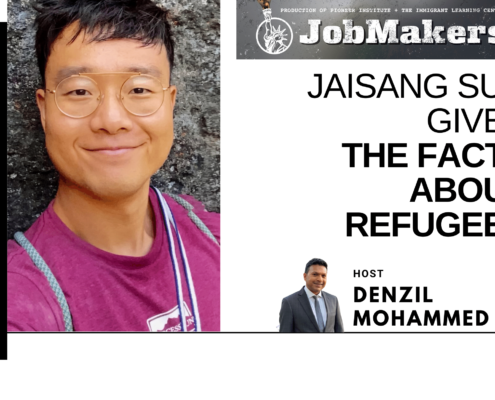
Jaisang Sun Gives the Facts About Refugees
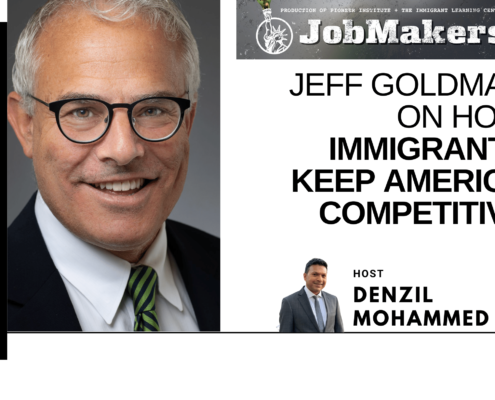
Jeff Goldman on How Immigrants Keep America Competitive

Trevor Mattos Shows How Massachusetts Runs on Immigrants
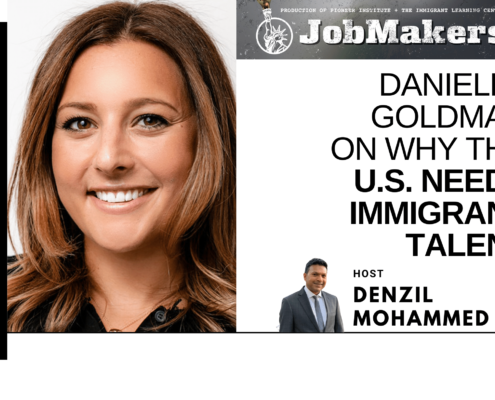
Danielle Goldman on Why the U.S. Needs Immigrant Talent
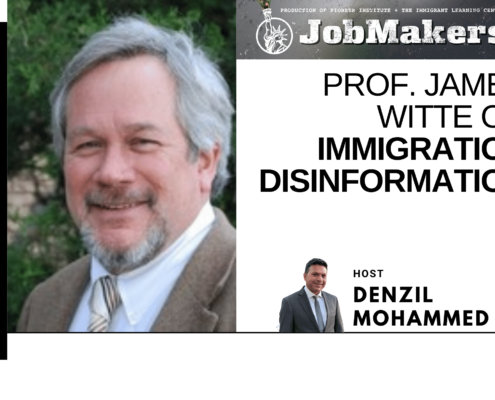
Prof. James Witte on Immigration Disinformation
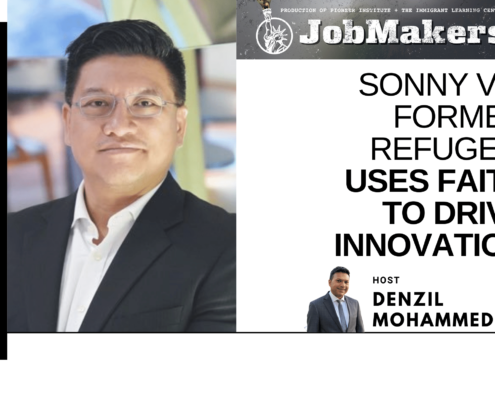
Sonny Vu, Former Refugee, Uses Faith to Drive Innovation
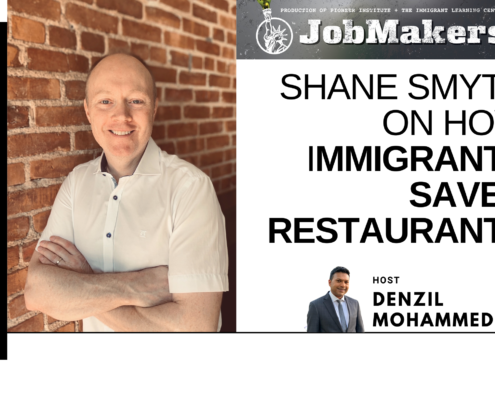
Shane Smyth on How Immigrants Saved Restaurants
